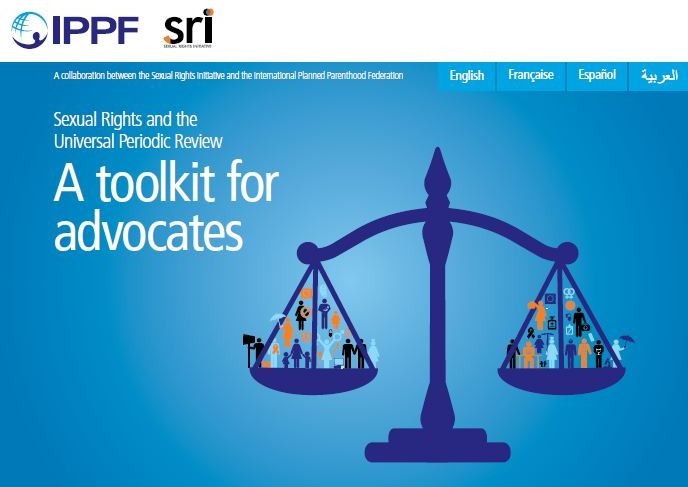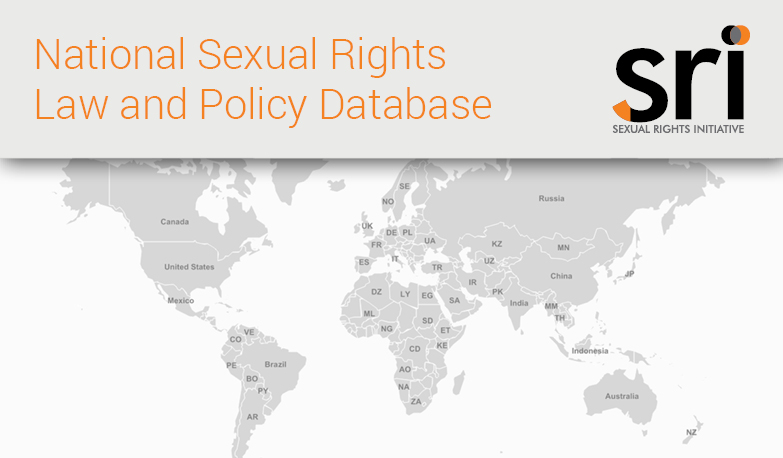Everything You Need to Know About UPR 29
The 29th session of the Universal Periodic Review (UPR) was held at the UN Human Rights Council, in Geneva, from January 15 to 26 2018.
Fourteen countries were reviewed during UPR29: Bahamas, Barbados, Botswana, Burundi, France, Israel, Liechtenstein, Luxembourg, Mali, Montenegro, Romania, Serbia, Tonga, and United Arab Emirates.
Adoption of UPR Outcomes: June 2018
The UPR outcome for each State reviewed during UPR29 will be adopted at the 38th session of the HRC (June 2018). The outcome report indicates which recommendations the State agrees to implement and its responses to other recommendations. This is the only opportunity for civil society to make an oral statement during the official UPR process. The SRI, in collaboration with partners and allies, will work to ensure that sexual and reproductive rights are visible during this segment of the UPR process.
The intervening period is an opportunity to engage in dialogue with States on accepting relevant recommendations – and, at the same time, not accepting those recommendations that are inconsistent with human rights norms and standards. It is also a means for gaining the support of media and the general public.
Below are some sexual rights related highlights from each UPR29 review. Click here for the full list of recommendations made related to sexual rights, including State responses to date.
Bahamas
Deferred Recommendations
- Pass legislation that would criminalize marital rape (United States of America)
- Ensure that women are able to pass their nationality to their children on equal footing with men, including by withdrawing the reservation on Article 9(2) of CEDAW (Iceland)
- Make legislation on abortion more lenient (France)
Barbados
Deferred Recommendations
- Repeal the provisions that criminalize consensual homosexual relations, notably those contained in the Sexual Offences Act, and establish policies to combat discrimination, prejudice and violence based on sexual orientation and gender identity (Iceland)
- Improve access to quality health-care services for all, including in remote areas, as well as address challenges of maternal mortality (Indonesia)
- Adopt specific legislation to prevent and combat sexual harassment in all areas (Honduras)
Botswana
Accepted Recommendations
- Criminalize domestic violence and continue the elaboration and implementation of public policies to prevent, address, punish and eradicate all forms of violence against women, including building help centres for women victim of violence (Paraguay)
Deferred Recommendations
- Authorize sex changes (France) Affirm that there is no international human right to abortion and resist calls to liberalize abortion and further implement laws aimed at protecting the right to life of the unborn child (Kenya)
Noted Recommendations
- Build upon recent court decisions upholding the human rights of transgender persons and take action to decriminalize LGBTI status or conduct (United States of America)
Burundi
Deferred Recommendations
- Amend the Code on Persons and Family and the Nationality Code, in order to remove the gender discriminatory provisions therein contained (Namibia)
- Take the necessary measures to repeal the legal provisions which criminalize and discriminate against LGBTI people (Argentina)
- Investigate cases and prosecute perpetrators of acts of violence against women, including physical abuse, rape, mutilation and torture (Poland)
France
Deferred Recommendations
- Ensure the follow up and an independent assessment of the implementation of the mobilisation plan against anti-LGBT hatred and discrimination (2017-2020) (Austria)
- Continue the designing and implementation of public policies to prevent, address, sanction and eliminate all forms of violence against women, including female genital mutilation and early and forced marriage (Paraguay)
- Implement the recommendations of the Defender of Rights on the introduction of a clear and precise definition of sexual harassment in the draft law on equality and citizenship (Greece)
Israel
Deferred Recommendations
- Withdraw its reservations to articles 16 and 7 (b) to the Convention on the Elimination of All Forms of Discrimination against Women (Honduras)
- Strengthen measures to combat gender-based violence including through the implementation of relevant laws to ensure justice for victims (Rwanda)
- Incorporate in legislation the principle of gender equality and non-discrimination in the public and private spheres (Plurinational State of Bolivia)
Liechtenstein
Deferred Recommendations
- Ease the very strict legislation on abortion (France)
- Adopt a new National Action Plan on Violence against Women in follow-up to the Plan that had been adopted in 2006 (Kyrgyzstan)
- Promote the training for women in non-traditional fields and in areas that would provide them with equal career opportunities (Ghana)
- Provide training to authorities involved in asylum procedures on identifying and dealing with victims of trafficking and gender-specific violence to protect asylum-seeking female migrants who may be overlooked and risk becoming victims of trafficking (Republic of Korea)
Luxembourg
Deferred Recommendations
- Continue to take the necessary measures to implement all elements of the Optional Protocol to the Convention on the Rights of the Child on the sale of children, child prostitution and child pornography, notably by strengthening its legal framework to protect children from sexual exploitation (Switzerland)
- Continue to progress legal protections for LGBTI persons by adopting the May 2017 Draft Law on the modification of sex and names, and amendment of the Civil Code, and increasing publicly available information on rights for intersex persons (Australia)
- Ensure that the prohibition of gender-based discrimination is duly complied with, and intensify efforts to reduce the wage gap between women and men (Uruguay)
Mali
Accepted Recommendations
- Implement a national strategy for increased participation and representation of women in general elections (Czechia)
Deferred Recommendations
- Eliminate all discriminatory provisions and practices against women and girls contained in the Personal and Family Code including those relating to inheritance and the obligation to obey the husband (Paraguay)
- Adopt a legislation outlawing all forms of gender based violence, including the traditional practice of female genital mutilation (India)
- Establish the same age of marriage for boys and girls as 18, and strengthen efforts aimed at ending child, early and forced marriage (Sierra Leone)
Montenegro
Accepted Recommendations
- Install more effective control mechanisms for hospitals which perform prenatal genetic tests for the detection of sex in foetuses. Due to the transnational nature of the issue, a close coordination with Serb governmental agencies should be targeted (Germany)
- Strengthen public policies to improve representation of women in public and political life (Plurinational State of Bolivia)
- Ensure victims of domestic violence are provided with comprehensive counselling and rehabilitation services and that training is provided on regular basis to sensitize all key personnel and authorities handling cases of domestic violence (Malaysia)
Deferred Recommendations
- Reform the existing legal provision that requires transgender persons to undergo a surgical intervention in order to obtain legal recognition (Portugal)
Romania
Deferred Recommendations
- Adopt a national strategy to raise awareness among Romanian population about traditional harmful practices against women and discriminatory gender stereotypes (Uruguay)
- Introduce a national HIV prevention strategy and work with civil society for its implementation (Australia)
- Introduce education for sexual and reproductive health in the core curriculum for secondary education, including by setting out a concrete timeline of implementation of such a measure (Slovenia)
- Strengthen legislative efforts to end child, early and forced marriage and sexual exploitation of children (Sierra Leone)
Serbia
Accepted Recommendations
- Formulate and implement systematic measures toward eradication of stereotypes regarding women in society creating a climate of zero tolerance for violence against women (Slovenia)
Deferred Recommendations
- Strengthen discrimination protections for LGBTI persons, and enact legislation that includes protection from discrimination on the grounds of intersex status (Australia)
- Review and revise the Criminal Code, the Family Code and other relevant laws with a view to effectively prevent all forms of violence against women (Estonia)
Tonga
Accepted Recommendations
- Take the necessary measures to improve access to health, especially for children and women during pregnancy, childbirth and the post-delivery period (Algeria)
- Take the necessary measures to modify the national legislation to increase the legal minimum age for marriage, as well as to raise awareness of deeply rooted attitudes and stereotypes, in particular by investigating and sanctioning cases in which girls are forced to marry children with whom they have been seen or even with their rapists (Argentina)
Deferred Recommendations
- Carry out regulatory reforms so that women can decide to perform contraceptive medical interventions and any other practice related to their health (Uruguay)
United Arab Emirates
Deferred Recommendations
- Amend Federal Decree Law No.2 of 2015 to include prohibition of discrimination based on sex (Denmark)
- Modify the laws to enable Emirati women to pass nationality to their children (Sierra Leone)
- Expedite on the enactment of the law on domestic abuse prevention (Maldives)
Click here for the full list of UPR29 Sexual rights recommendations

Read the SRI & I
UPR Toolkit for Sexual Rights Advocates
Available in English, French, Portuguese, Spanish & Arabic.

The National Sexual Rights Law and Policy Database documents and compares the status of law and policy related to sexual rights issues in different countries around the world.
Click here to access the database